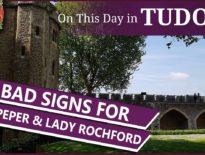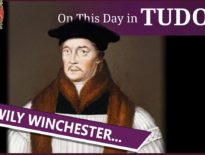On this day in Tudor history, 13th November 1536, mercer and member of Parliament Robert Packington (Pakington, Pakyngton) was shot to death by an unknown assailant while he was on his way to mass at St Thomas of Acre Chapel. He was shot with a wheellock pistol.
Robert Packington has gone down in history as the first person in England to be killed by a handgun, but who killed him and why?
Find out about Packington, his murder, and the theories regarding who ordered his murder, in today's talk.
Derek Wilson article - https://www.historyextra.com/period/tudor/the-hunt-for-the-tudor-hitman/
Book recommendation - The First Horseman by Derek Wilson
Also on this day in Tudor history, 13th November 1553, the former Queen Jane, or Lady Jane Grey, was tried for treason at Guildhall in London. She wasn't the only one tried, her husband Lord Guildford Dudley, his brothers Ambrose and Henry Dudley, and Thomas Cranmer, Archbishop of Canterbury, were also tried for treason for their parts in putting Jane on the throne. Find out more about their trials, and what happened to them, in last year’s video:
Also on this day in history:
- 1537 – Burial of Jane Seymour, Henry VIII's third wife, at St George's Chapel, Windsor Castle. Henry VIII's daughter, Mary, acted as chief mourner.
- 1601 – Burial of Lady Mary Ramsey (née Dale), famous philanthropist, at Christ Church in London.
- 1612 – Death of Sir George Carew, administrator, member of Parliament and diplomat, from typhus at his home in Tothill Street, Westminster, London. He was buried at St Margaret's Church, Westminster. Carew's served as secretary to Lord Chancellor Hatton and served Elizabeth I and James I as an ambassador.
Transcript:
On this day in Tudor history, 13th November 1536, mercer and member of Parliament Robert Packington was shot to death by an unknown assailant while he was on his way to mass at St Thomas of Acre Chapel. He was shot with a wheellock pistol.
Packington was laid to rest at St Pancras Church on 16th November, with reformer Robert Barnes preaching at his funeral. He left behind a wife and two young sons.
Chronicler Edward Hall gave an account of Packington’s murder. Here is what he wrote:
“In this year, one Robert Packyngton, Mercer of London, a man of good substance, and yet not so rich as honest and wise, this man dwelled in Cheapside at the sign of the leg, and used daily at four of the clock Winter and Summer to rise and go to Mass at a church then called saint Thomas of Acres (but now named the Mercers chapel) and one morning among all other, being a great misty morning such as hath seldom been seen, even as he was crossing the street from his house to the church, he was suddenly murdered with a gun, which of the neighbours was plainly heard, and by a great number of labourers at the same time standing at Soper lane end, he was both seen go forth of his house, and also the clap of the gun was heard, but the deed doer was never espied nor known, many were suspected, but none could be found faulty: howbeit it is true, that forasmuch as he was known to be a man of a great courage and one that both could speak & also would be heard: and that the same time he was one of the burgesses of the parliament, for the City of London, and had talked somewhat against the covetousness and cruelty of the Clergy, he was had in contempt with them, and therefore most like by one of them thus shamefully murdered as you perceive that Master Hunne was in the sixth year of the reign of this king.”
The Master Hunne, Hall is referring to, was Richard Hunne, a merchant tailor who was arrested for heresy by church officials after he had tried to use the common law courts against the church after a dispute with a priest over his son’s burial. He was found dead in his prison cell in 1514 and it was suspected he’d been murdered by church officials.
Martyrologist John Foxe included Robert Packington in his famous Book of Martyrs, although he mistakenly dated his death to 1538. He used Hall’s record word for word, but added bits, for example:
“Although many in the mean time were suspected, yet none could be found faulty therein, the murderer so covertly was conveyed, till at length, by the confession of Dr. Incent, dean of Paul's, on his death-bed, it was known, and by him confessed, that he himself was the author thereof, by hiring an Italian, for sixty crowns or thereabouts, to do the feat...”
and writing that Packington was all the more held in disdain by the clergy because he “was thought also to have some talk with the king” and that the was murdered “by the said Dr. Incent for his labour”.
In an earlier edition of his work, Foxe put the blame of John Stokesley, Bishop of London.
Foxe also explained that Packington was the brother of Augustine Packington “who”, he explains, “deceived Bishop Tonstal, in buying the new translated Testament of Tyndale”.
Edward Hall also writes of Augustine Packington and the Bishop of London, explaining that Packington, who “was a man that highly favoured William Tyndale”, helped William Tyndale by getting the Bishop of London to buy a load of New Testaments. Tyndale was in debt at the time and was also in danger, having a lot of copies of his New Testament in his possession, so Packington told the bishop that he could get hold of copies of the New Testament for the bishop to burn as heretical books if the bishop paid for them. Packington then bought them from Tyndale. Hall writes of Tyndale’s reaction to this deal: “I am the gladder, said Tyndale, for these two benefits shall come thereof, I shall get money of him for these books, to bring myself out of debt, and the whole world shall cry out upon the burning of God’s work. And the overplus of the money that shall remain to me, shall make me more studious to correct the said New Testament, and so newly to imprint the same once again, and I trust the second will much better like you, than ever did the first.” What a deal!
Chronicler Raphael Holinshed writes that the murderer was eventually discovered:
“at length the murderer indeed was condemned at Banbury in Oxfordshire to die for a felony which he afterwards committed, and when he came to the gallows on which he suffered, he confessed that he did this murder, and till that time he was never had in any suspicion thereof.”
It’s hard to know what happened, but, like his brother, Robert Packington was of the reformed faith, with Protestant Rose Hickman recalling how he “used to bring English Bible from beyond the sea”. The Packington brothers as merchants who would travel to Antwerp on business were in a perfect position to take Bibles and other religious books back to England. It does appear that Robert Packington’s faith and his criticism of the clergy led to his violent death.
Historian and author Derek Wilson points out that “poor Robert Packington probably holds the dubious distinction of being the first person in England to be killed with a handgun”, and I’ll give you a link to read more about Packington’s murder in Wilson’s article for History Extra, "The Hunt for the Tudor Hitman". Wilson also used Packington's unsolved murder in his historical thriller “The First Horseman”, which is well worth a read.



Leave a Reply